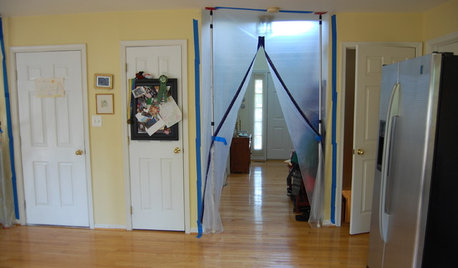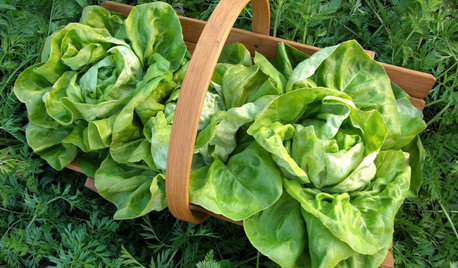Dreaded squash bugs have arrived
jdlaugh
11 years ago
Featured Answer
Sort by:Oldest
Comments (44)
miraje
11 years agolast modified: 9 years agoOkiedawn OK Zone 7
11 years agolast modified: 9 years agoRelated Discussions
Anyone Grown Squash and not gotten SVB or Squash bugs?
Comments (61)I got tired of growing pumpkins and squash that were always killed by the dreaded SVB. I found an article in Mother Earth News that explained all about the moth that lays the egg that grows into the SVB..anyway if you grow Cucurbita moshata..a type of squash that has dense solid stems they are totally immune to SVB damage. I grew a Rumbo pumpkin that was wonderful. It is actually a cross between a winter squash and pumpkin. If you read the seed catalogs that give the real botanical names you can find other types as well. The Rumbo's were delicious and beautiful too. The only thing is that you can't carve them like a jack o lantern because they are dense. I got my original seeds from Jungs but Parks used to carry them too. There are also several varieties in the Baker Creek catalog as well. I attached a link to the Rumbo so you can see it. Here is a link that might be useful: Rumbo pumpkin...See Moresquash bugs- it's weird
Comments (4)Hi Mrs H, good to "see" you. Here there are fewer SBs but still enough for me to notice them and pick off eggs and kill nymphs. Last evening it rained a bit so I went out to catch the adult SBs which always rise to the top to dry off, but to my surprise not a single one was found (not on squashes nor pumpkins). But the Sq vine borers are more than making up for the absence of the SBs. Most all the summer Squash are infected now with SVBs but by planting the pumpkins & winter squashes later I've been able to keep a closer eye on their root/stems and target "dust" with rotenone. Once the pumpkins & WS start to spread out and bloom though it'll be more vine for the borers to attack. A few stink bugs so far but not like last year when the tomatoes fell victim to them. Still a bit early to declare victory on these. vgkg...See MoreSquash Bugs on Seminole Pumpkins; what do I do/not do?
Comments (1)Forgot to mention that friends of ours raise guineas, and they say they are wonderful to put on "bug patrol", [although they don't raise pumpkins] We could probably get a couple within a few days.....do they eat squash bugs, [without eating the squash?]...See MoreSquash bugs - forgive me Nature, for I have sinned
Comments (41)SVBs do attack gourds, although it seems like gourds are not necessarily their favorite thing. Sometimes they kill mine and sometimes they don't. They seem to bother decorative warted gourds more than they bother birdhouse gourds. The nice thing about catnip is you only have to plant it once. After that, it will reseed itself everywhere. I always let mine bloom its head off because the flowers attract beneficial insects. Catmint is another great companion plant for squash and other plants. I have "Walker's Low" catmint growing near my squash. Amy, Gently rub a leaf of your catnip-looking plant between your fingers and see if you pick up a catnip aroma. Their scent is present from a pretty early age. I think I have lost one Seminole plant one year, and I never checked it to see if it was SVBs that got it or if it was bacterial wilt or something similar. The other Seminole plants just filled in the area where the deceased plant had been growing and within a couple of weeks, it was so well filled-in that no one but I knew that a plant had died there in that row. In a good year, Seminole runs 30-40' across my garden and I let it do as it pleases because it grows in conditions, and under pest pressure, that nothing else can and will tolerate, except for other C. moschata winter squash. This year I planted both the regular fruited Seminole and the ones with the larger fruit. In the past, I've only grown the regular one. C. moschatas are as close to being SVB-proof as anything else I've ever grown. Squash bugs and squash vine borers are a big problem roughly 8 years out of 10 for everything except the C. moschata types. Over the years, I basically dropped all the C. pepo and C. maxima types of pumpkins, replacing them with C. moschata types. I just got tired of fighting the SVBs every year, so figured I'd work smarter instead of working harder, and replaced them with C. moschatas that deter the SVBs for me. Dawn...See Moresoonergrandmom
11 years agolast modified: 9 years agoOkiedawn OK Zone 7
11 years agolast modified: 9 years agogreenacreslady
11 years agolast modified: 9 years agosoonergrandmom
11 years agolast modified: 9 years agoOkiedawn OK Zone 7
11 years agolast modified: 9 years agoOkiedawn OK Zone 7
11 years agolast modified: 9 years agogreenacreslady
11 years agolast modified: 9 years agoOkiedawn OK Zone 7
11 years agolast modified: 9 years agosoonergrandmom
11 years agolast modified: 9 years agoOkiedawn OK Zone 7
11 years agolast modified: 9 years agobiradarcm
11 years agolast modified: 9 years agoOkiedawn OK Zone 7
11 years agolast modified: 9 years agomiraje
11 years agolast modified: 9 years agojdlaugh
11 years agolast modified: 9 years agoOkiedawn OK Zone 7
11 years agolast modified: 9 years agoBMinchey
10 years agolast modified: 9 years agoborderokie
10 years agolast modified: 9 years agoOkiedawn OK Zone 7
10 years agolast modified: 9 years agoJoyce
8 years agoOkiedawn OK Zone 7
8 years agohaileybub(7a)
8 years agokfrinkle
8 years agoOkiedawn OK Zone 7
8 years agohaileybub(7a)
8 years agochickencoupe
8 years agohaileybub(7a)
8 years agoAmyinOwasso/zone 6b
8 years agoOkiedawn OK Zone 7
8 years agostockergal
8 years agohaileybub(7a)
8 years agochickencoupe
8 years agoOkiedawn OK Zone 7
8 years agostockergal
8 years agochickencoupe
8 years agostockergal
8 years agohazelinok
8 years agochickencoupe
8 years agohaileybub(7a)
8 years agoOkiedawn OK Zone 7
8 years agohazelinok
8 years agosoonergrandmom
8 years ago
Related Stories

GARDENING AND LANDSCAPINGScreen the Porch for More Living Room (Almost) All Year
Make the Most of Three Seasons With a Personal, Bug-Free Outdoor Oasis
Full Story
HEALTHY HOMEWhat to Know About Controlling Dust During Remodeling
You can't eliminate dust during construction, but there are ways to contain and remove as much of it as possible
Full Story
GARDENING GUIDES10 Easy Edibles for First-Time Gardeners
Focus on these beginner-friendly vegetables, herbs, beans and salad greens to start a home farm with little fuss
Full Story
MOST POPULARMy Houzz: Open-Air Living in the Mountains of Bali
Community, jaw-dropping beauty and sustainability come together in a tropical paradise for a London expat
Full Story
EDIBLE GARDENSHow to Grow Your Own Sweet Summer Crops
This guide will help any gardener get started on growing the freshest warm-season veggies and berries for summer
Full Story
HOUSEKEEPING20 Things You Might Be Forgetting to Spring-Clean
Clean these often-neglected areas and your house will look and feel better
Full Story
FEEL-GOOD HOME6 Design Ideas for Happy Pets
Keep your dog or cat feeling safe and in high spirits, and you'll all feel more at peace. Here's how
Full Story
GARDENING GUIDESHow to Switch to an Organic Landscape Plan
Ditch the chemicals for a naturally beautiful lawn and garden, using living fertilizers and other nontoxic treatments
Full Story
ORGANIZING7-Day Plan: Get a Spotless, Beautifully Organized Kitchen
Our weeklong plan will help you get your kitchen spick-and-span from top to bottom
Full Story
HOLIDAYSSurviving the Christmas Countdown: A Parent's Guide
Make things easier on yourself, for heaven's sake — and for the sake of truly enjoying the holiday with your family
Full StorySponsored
Columbus Area's Luxury Design Build Firm | 17x Best of Houzz Winner!



hazelinok